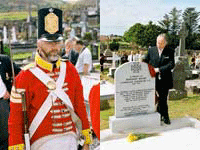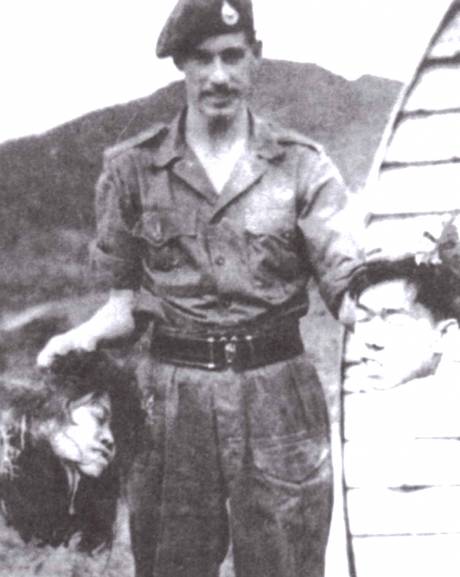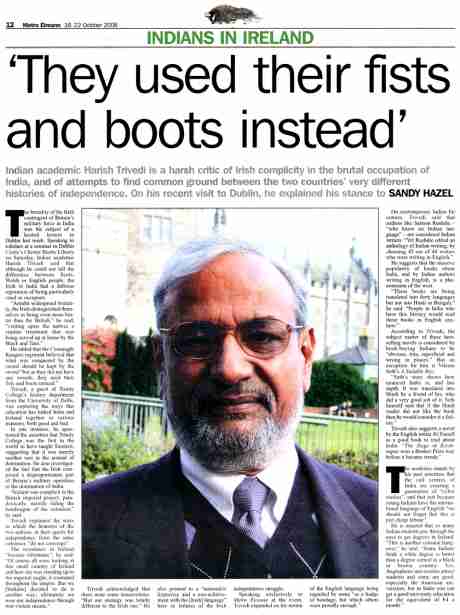New Mayo Member of the British Empire (M-MBE): insult to Indian (and every other) fight for freedom
 mayo |
anti-war / imperialism |
news report
mayo |
anti-war / imperialism |
news report  Saturday January 09, 2010 20:20
Saturday January 09, 2010 20:20 by Harry Wells - The Well Well Well Foundation
by Harry Wells - The Well Well Well Foundation
'For God and the Empire,' says Mayo man's medal
Michael Feeney is becoming an M-MBE for organising a war park that is called, not surprisingly, a ‘peace’ park. It celebrates soldiers who helped put down India’s first fight for independence, and who fought and died in the British and US armies. It is a celebration of those who killed people struggling for their freedom against imperialism and colonialism.
The only qualification the killers meet is having been born in Ireland. Feeney's Member of the British Empire (MBE) medal also states, 'For God and the Empire.'
Mid Western Radio (MWR), reported on January 5th 2010:
“A mayo man has been named in the 2009 [British] queen’s honours list. Michael Feeney from Mac Hale Road, Castlebar, will travel to Buckingham Palace with his family later this year to personally receive an MBE [Member of the British Empire] from Queen Elizabeth.
In 1999, Mr. Feeney first proposed erecting a fitting memorial to the legions of young men and women from the county who have lost their lives in conflicts and wars from the last century to the present day.
Mr. Feeney’s dream was realised on October 7, 2008 when the president, Mary McAleese, officially opened the mayo peace park garden of remembrance…
The [British] queen’s citation says Mr Feeney is deemed to merit his award because of his work in “improving Irish - UK relations.”
A previous Indymedia report stated: “a participant in one of the greatest war crimes in history was honoured in Mayo [in 2004] by a minister of the Irish government. Sergeant Major Cornelius Coughlan (Victoria Cross) of the Gordon Highlanders was praised by Defence Minister Michael Smith for his role in putting down the so-called Indian Mutiny of 1857, which Indians call their First War of Independence.” Smith was accompanied by a pantomime army of volley firing redcoats with muskets of the type used to kill Britain's imperial subjects and a very self-satisfied British Ambassador - who probably could not believe his luck.
The corny Cornelius Coughlan celebrations started the war park bandwagon, propelled along by supporters in the Irish Times, Independent and in RTE. Objectivity is out in the headlong rush to re-embrace imperial culture and to dismiss the 1916 uprising, the 1918 Sinn Fein election victory and the War of Independence. A recent RTE published book on the Irish who fought and died in British uniform in the First World War is called ‘Our War.’ The only reason there were not more Irish dead to celebrate is because of republican anti-recruiting activity and the 1916 uprising. After that enlistment in the killing machine dried up. In their desperation, the British threatened conscription in 1918, an action that generated further support for Sinn Fein and the IRA.
For the Irish pro-imperial cheer leaders and literati today, Imperialism rocks, it is the new black. What’s next, role on racism and fascism? Don’t be surprised, unless this current media promotion of pro-imperial propaganda is challenged and rolled back.
What did the Irish do in Britain’s army, anyway?
University of Delhi academic, Harish Trivedi, said “the Irish in India had a dubious reputation for being particularly cruel as occupiers. Amidst widespread brutality, the Irish distinguished themselves as being even more brutal than the British” (see graphic – CLICK to READ). Why not, they were British hirelings, obliged to vent their subservient self-hatred on a subject people they were paid to put down. Just as the Germans enlisted Ukranians, Austrians, Romanians and others to run its death camps, the British enlisted subject peoples in its armies and colonial administration to tame other parts of its empire.
See also, The Irish in Foreign Armies: REMEMBRANCE, http://www.indymedia.ie/article/89339, for info on the Irish who helped put down the Kenyan rebellions of the 1950s. Have a look at the British soldier holding up the two severed heads contributed in aid of Britain putting down resistance in Malaya. If he was Irish, why not celebrate him?
The Mayo War Park is park of the effort to sanitise Britain’s imperial project, while the Irish government and its mass media tries to reverse Ireland’s anti-colonial heritage and become part of the EU’s imperial project. The Irish Times, returning to its pro-British roots, even ran a regular column in 2008 from a Lt Bury, a British soldier in Afghanistan, simply on the basis that he is from Wicklow.
Part of the big lie suggests that Irish cannon fodder willingly joined these armies in the past. The answer came from Irish former members of the British and US armies who had no illusions about the nature of the forces they had joined and who dismissed the colonial mindset of Irish apologists for empire:
Irish Times Tuesday, September 23, 2008
Irishmen in British uniforms
Madam, - Six months after emigrating to the US in November 1961, I received a notice from "Uncle Sam", through the local draft board, to report for duty at an induction centre in Brooklyn, New York. My instinct was to go home to Ireland, but having neither the wherewithal to return, nor any prospects on a small farm in the West of Ireland, I felt I had no choice but to comply.
Days later I was inducted, sworn to "pledge allegiance to the flag of the United States of America" given a uniform and sent off to Fort Dix, New Jersey for basic training. I served six years with the US army engineers during the "Cuban Crisis" and the early years of the Vietnam War before being discharged in 1968.
I may have wished, as Sarsfield did, "that this were for Ireland", but it wasn't; and at no time did I consider myself to be an Irish soldier. How could I? I agree with Séamus Ua Trodd (September 11th) that he was an Irish soldier. But I was not.
The Irish nation afforded neither me, nor my fellow countrymen in the American army, any recognition - nor did we ask for any! We were cannon fodder for empire, nothing more.
The notion that Irishmen in the British army, either now or in the past, deserve special attention because they claim to be Irish soldiers or to serve Ireland, is preposterous.
As a nation we have broken the physical chains of the British Empire that bound us; decolonisation of the mind may yet take some time. - Yours, etc,
JOE McGOWAN, Mullaghmore, Co Sligo
Irish Times Thursday, September 18, 2008
Irishmen in British uniforms
Madam, - I write on the on-going debate on "Irishmen in British uniforms". I was that soldier.
I ended up many years ago in the British Army due to the fact that (a) I happened to be resident in England for work purposes and (b) was officially a British subject having been born before the Declaration of a Republic in 1949, and was unfortunate to receive my "call-up papers" for national service. I was completely surprised by this, not being aware of my eligibility. But for the fact that I had been engaged to my English girlfriend for only one week, I would have been on the first boat back home, hoping to continue the relationship from long distance. However, my heart ruled my head, and I accepted my fate.
Having spent all of my childhood in care, I took to the discipline and security of military life like the proverbial duck to water. After a few months, I signed up as a regular, as opposed to a conscript, the extra pay being welcome as I was now married. I served a total of 18 years, reaching the rank of sergeant.
My subsequent disillusionment, and shame, at having been a British soldier came about as a result of the treatment of Irish nationalists by the British Army during the "Troubles" in Northern Ireland, but even more so by the attitude of Margaret Thatcher towards the hunger strikes; to the extent that I returned the two medals awarded during my service.
Had I realised that I was suited to military life prior to being called up to the British army, I would most certainly have joined the Army of my own country, and not, like Lt Bury and others, join a foreign army in order to "gain adventure" in assisting the occupation of another country and, let us be honest, the deaths of innocent civilians. - Yours, etc,
PETER PALLAS, Clarecastle, Ennis, Co Clare
A fitting Irish response to this imperial craw thumping would be an event in remembrance and memory of the victims of empire on the day the Feeney fool appears in Buckingham Palace to get his gong.

FF minister Michel Smith celebrates British redcoat (Irish turncoat) Cornelius Couglan

How the British put down rebellion in Malaya - Mayo War Park please copy

How the British put down rebellion in Kenya - plenty of Irish to help out

